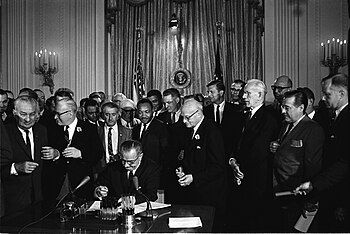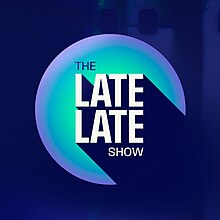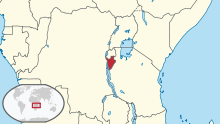The 1960s Portal
The 1960s became synonymous with the new, radical, and subversive events and trends of the period. In Africa the 1960s was a period of radical political change as 32 countries gained independence from their European colonial rulers. Some commentators have seen in this era a classical Jungian nightmare cycle, where a rigid culture, unable to contain the demands for greater individual freedom, broke free of the social constraints of the previous age through extreme deviation from the norm. Christopher Booker charts the rise, success, fall/nightmare and explosion in the London scene of the 1960s. However, this alone does not explain the mass nature of the phenomenon. Several nations such as the U.S., France, Germany and Britain turned to the left in the early and mid 1960s. In the United States, John F. Kennedy, a Keynesian and staunch anti-communist, pushed for social reforms. His assassination in 1963 was a stunning shock. Liberal reforms were finally passed under Lyndon B. Johnson including civil rights for African Americans and healthcare for the elderly and the poor. Despite his large-scale Great Society programs, Johnson was increasingly reviled by the New Left at home and abroad. The heavy-handed American role in the Vietnam War outraged student protestors across the globe, as they found peasant rebellion typified by Ho Chi Minh and Che Guevara more appealing. Italy formed its first left-of-center government in March 1962 with a coalition of Christian Democrats, Social Democrats, and moderate Republicans. Socialists joined the ruling block in December 1963. In Britain, the Labour Party gained power in 1964. In Brazil, João Goulart became president after Jânio Quadros resigned. This is a Featured article, which represents some of the best content on English Wikipedia..
The 1964 European Nations' Cup Final was a football match at the Santiago Bernabéu Stadium, Madrid, on 21 June 1964, to determine the winner of the 1964 European Nations' Cup. It was the second final of what is now called the UEFA European Football Championship, UEFA's quadrennial football competition for national teams. The match was contested by Spain and the previous tournament winners, the Soviet Union. En route to the final, Spain defeated Romania, Northern Ireland and the Republic of Ireland over two-legged ties before beating Hungary in the semi-final. The Soviet Union received a bye in the qualifying round before beating Italy, Sweden and Denmark en route to the final. The referee for the final, played in front of an attendance of 79,115 spectators, was Arthur Holland from England. In the sixth minute, Marcelino dispossessed Valentin Ivanov and crossed for Chus Pereda, who scored to give Spain a 1–0 lead. Two minutes later, Viktor Anichkin passed to Galimzyan Khusainov, who equalised. With six minutes of the match remaining, Pereda beat Anichkin and played in a cross which Viktor Shustikov failed to clear, before Marcelino headed the winning goal inside the near post. Spain won the match 2–1 to win their first European Championship title. (Full article...)This is a Good article, an article that meets a core set of high editorial standards.
An attempted coup d'etat in Burundi took place between 18–19 October 1965, when a group of ethnic Hutu officers from the Burundian military and gendarmerie attempted to overthrow Burundi's government. The rebels were frustrated with Burundi's monarch, Mwami Mwambutsa IV, who had repeatedly attempted to cement his control over the government and bypassed parliamentary norms despite Hutu electoral gains. Although the prime minister was shot and wounded, the coup failed due to the intervention of a contingent of troops led by Captain Michel Micombero. The attempted coup d'état provoked a backlash against Hutus in which thousands of people, including the participants in the coup, were killed. The coup also facilitated a militant Tutsi backlash against the monarchy resulting in two further coups which culminated in the abolition of the monarchy in November 1966 and the proclamation of a republic with Micombero as President of Burundi. (Full article...)Selected picture - United States President Lyndon B. Johnson (seated) signs the Civil Rights Act of 1964, a landmark piece of legislation that outlawed racial segregation in schools, public places, and employment. Among the guests behind him is Martin Luther King Jr. (directly behind and to the right of Johnson).
Did you know -
Related portalsThis is a Featured article, which represents some of the best content on English Wikipedia..
Sir Richard Starkey MBE (born 7 July 1940), known professionally as Ringo Starr, is an English musician, songwriter and actor who achieved international fame as the drummer for the Beatles. Starr occasionally sang lead vocals with the group, usually for one song on each album, including "Yellow Submarine" and "With a Little Help from My Friends". He also wrote and sang the Beatles songs "Don't Pass Me By" and "Octopus's Garden", and is credited as a co-writer of four others. Starr was afflicted by life-threatening illnesses during childhood, with periods of prolonged hospitalisation. As a teenager Starr became interested in the UK skiffle craze and developed a fervent admiration for the genre. In 1957, he co-founded his first band, the Eddie Clayton Skiffle Group, which earned several prestigious local bookings before the fad succumbed to American rock and roll around early 1958. When the Beatles formed in 1960, Starr was a member of another Liverpool group, Rory Storm and the Hurricanes. After achieving moderate success in the UK and Hamburg, he quit the Hurricanes when he was asked to join the Beatles in August 1962, replacing Pete Best. (Full article...)This is a Good article, an article that meets a core set of high editorial standards.
Keith Richards (born 18 December 1943) is an English musician, songwriter, singer and record producer who is an original member, guitarist, secondary vocalist, and co-principal songwriter of the Rolling Stones. His songwriting partnership with the band's lead vocalist Mick Jagger is one of the most successful in history. His career spans over six decades, and his guitar playing style has been a trademark of the Rolling Stones throughout the band's career. Richards gained press notoriety for his romantic involvements and illicit drug use, and he was often portrayed as a countercultural figure. First professionally known as Keith Richard, by the early 1970s he had fully asserted his family name. Richards was born in and grew up in Dartford, Kent. He studied at the Dartford Technical School and Sidcup Art College. After graduating, Richards befriended Jagger, Bill Wyman, Charlie Watts, Ian Stewart and Brian Jones and joined the Rolling Stones. As a member of the Rolling Stones, Richards also sings lead on some Stones songs. Richards typically sings lead on at least one song a concert, including "Happy", "Before They Make Me Run", and "Connection". Outside of his career with the Rolling Stones, Richards has also played with his own side-project, The X-Pensive Winos. He also appeared in two Pirates of the Caribbean films as Captain Teague, father of Jack Sparrow, whose look and characterisation was inspired by Richards himself. (Full article...)Selected article - The Late Late Show, with its title often shortened to The Late Late, is an Irish chat show. It is the world's second longest-running late-night talk show, after the American The Tonight Show, and is the longest-running live talk show. Perceived as the official flagship television programme of RTÉ, it is regarded as an Irish television institution, and is broadcast live across normally two hours in front of a studio audience on Friday nights at 9:30 pm between September and May. Certain segments are sometimes pre-recorded and aired within the live parts of the show. Having maintained the same name and format continuously, The Late Late Show was first broadcast on Friday, 6 July 1962 at 11:20 pm and in colour from 1976. Originating as temporary summer filler for a niche Saturday night audience (airing at 11:30 pm), it later moved to its current home on Friday night schedules. The format has remained largely the same throughout—interviews, musical performances, discourse on topical issues. It has influenced attitudes of the populace towards approval or disapproval of its chosen topics, directed social change and helped shape Irish societal norms. It averages 650,000 viewers per episode and has consistently achieved RTÉ's highest ratings. (Full article...)More Did you know (auto generated)
TopicsCategoriesWikiProjects
Associated WikimediaThe following Wikimedia Foundation sister projects provide more on this subject:
Discover Wikipedia using portals |





























